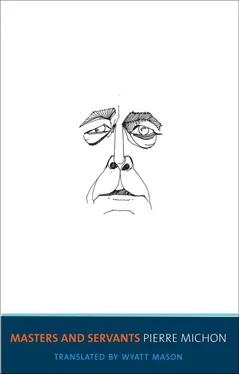Let’s have a last look at Aries through the fingers van Gogh places over his face, when he had once again botched a painting, or when he awoke December 25 and saw the gendarmes, the hand towel filled with blood, the broken washbowl; when he saw Mother Roulin come in whom nonetheless he had painted. Let’s look at Aries where there’s the little pont Langlois , so tender and blue, an even bluer sky; vaqueros; zouaves; a copy of the Forum républicain where you read on the third page that a Foreigner cut off his own ear and brought it to a whore; a petition left at the town hall, signed by a neighborhood that wants to lock up a man who doesn’t have all of his head, in which I hope with all my strength that the name of Mother Ginoux does not figure, the name of the queen of Spain; fields of wheat or melons and an old, infallible sun. We are leaving. We are not leaving Europe, as Armand Roulin will quite soon, and we remain on this earth that van Gogh has already abandoned. We are going to Marseille, with the great peacoat and cap of the post office, on a body growing old.
MARSEILLE IS NEARER TO THE SUN than Arles. Van Gogh — who never thought as far as Rome, who was too modest or barbaric to think that far — van Gogh had thought about Marseille throughout his life; I don’t know what novel had made him imagine it to be some sort of artists’ Mecca, as he’d said, but he was surely the only artist to think it so, all because the painter Monticelli had lived and died there — done in by arrogance, misery, and absinthe, a painter he ranked as highly as Rembrandt, Rubens, Delacroix — Monticelli whose paintings I wouldn’t know how to judge but that they tell me aren’t so ugly; all Manhattan’s gold didn’t come bail him out, and on some shadowy provincial grave, tourists read a name that means nothing to them, he is lost: perhaps he wasn’t radical enough; he wasn’t friends with Pissarro, Seurat, those of the beau monde; and, of course, he’s missing the blow from the Browning sur le motif and the massive psychiatric syndrome; or — if God had not forsaken us — he didn’t know how to paint a proprietress as a queen of Spain, nor the first verses of the first book in a wheatfield, while the sunlight yellows. So van Gogh wanted to go to Marseille with Gauguin, and they would have gone there if, after two months in the yellow house, they hadn’t come to blows about wind and circumstance, overcooked onions, or each of their supercilious failures; and they would have strolled along the Canebière in full regalia, straight out of a picture postcard and so deckedout that Vincent would have written about it to Théo — immense yellow hat, not the straw but some kind of Stetson, black velvet jacket and white pants, yellow gloves, a reed cane and the air of a southern gentleman; and who knows if this would only have been a picture postcard, if it should make us smile: who knows if a rich van Gogh wouldn’t have been as elegant as Manet, and just as smitten with etiquette. But he never made it there: and, postmortem, he delegated Roulin.
Great castles of canvas are still entering the Vieux Port of this era, Melville’s very own; there are sailors and provisions, insatiable hungers, knife wounds; the sea opens up beyond Joliette’s docks and straight across, on the other side, is Egypt, whence came the arts and the merchants, the plague; where there are towers as tall as Manhattan’s own, and in their padlocked basements, kings turned to ashes settled in gold, golden, as everywhere beneath the towers. Standing around the Vieux Port , Roulin doesn’t think about any of this; he considers a spot where the world passes by en masse, Sundays or early on a weekday morning; he’s thinking about Armand, who’s on the other side of the same sea, sweating the natives for gold; maybe he’s thinking about the radiant tomorrows for the proletariats of Valparaiso, Alexandria, Piraeus, where commodities of every color and every language will debark before their eyes, maybe even some paintings, the holy commodity; and this prince Roulin — decorated like an officer of Montenegro, but invisibly — is moved, forever young in a Roulin who is no longer. Then he turns his back on this restlessness and returns through the plane trees; nineteen-year-old girls sell oysters beneath the leaves; he sings that le temps des cerises has returned, but not for him, he must hurry; he doesn’t work here; he works at the train station where other commodities bustle about, but none of the holy commodity that was rolled up and sent to Théo, a station that may already be called Saint-Charles, at the top of those interminable stairs; and he labors to climb them.
After the letter from the little Ravoux, for ten years or more, he didn’t hear any news of van Gogh. He wasn’t expecting any. But in their kitchen — from which Armand had fled for the Colonies in the white tie and yellow vest we’ll imagine him wearing no matter what his age; the kitchen that Camille deserted as well, the child made from unsound dust that nonetheless a sea-freight shipping company, the Messageries maritimes , had taken under its wing and paid meagrely each month, so that he’d work in a dismal bonded warehouse in Toulon or Cassis with others as unsound as he; the same kitchen where the tense young man had always appeared for Roulin alone, behatted after Fouquier, or, on more carefree days, with a sky blue cap; the kitchen where Marcelle was still within earshot and in their arms, weaker than when she was two months old and braced against the future, already wasting away, silently; in their kitchen, therefore, perhaps hung with cheap Veronese wallpaper with fat dahlias, a celestial pasture, the muzhik and his baba spoke of Vincent from time to time. Newspapers reported, for example, the opening of the Salon , and they thought about how proud he would have been to be there, the poor guy: to go, he would have to have rented a stovepipe hat and a swallow-tailed coat, and they laughed imagining him in that get-up, boarding the train for Paris; or perhaps Augustine, while cleaning, found a letter, either from Monsieur Gogh or Monsieur Paul, from before he’d lost his marbles or afterward — she and Roulin didn’t agree. They argued about it a little. Mother Roulin felt sorry for him, slowly nodding her head with conviction, and Roulin, who was only listening out of one ear, envisioned all that effort spent for nothing in the fields of Aries, thrown to the wind, as violent and inconsequential as the passing of cowboys on horseback, in the shadows of the oak trees, at noon. They asked themselves what had become of the paintings, paintings that weren’t very pretty, but had cost so much suffering; at least at their house such pain had been in some way rewarded; at least one of these paintings had been unrolled and mounted in a handsome golden frame with large moldings that they themselves had chosen; one out of all of those things thrown furiously to the wind had been hung, and few of the world’s eyes had seen it there, as one sees the great work of the great painters at the Salon , and it was in their home, in their kitchen, between the chromo portrait of Blanqui and the talking bird’s cage, a blackbird or a myna, which could perhaps pronounce the names Anacharsis Cloots and Vincent van Gogh. Tolerant and unconvinced, moved, they turned their eyes to this painting I’ll return to, and they looked at it for a moment. It was already the dinner hour, they were eating, and more often than not it would be the two Vincentian oblations, the yellow potato and black coffee, Vincentian from Vincent’s first period that Roulin didn’t know; but of the third oblation — what Vincent called la blanche , which we also call the green, diabolical and solar, chrome yellow number three — only Joseph partook before eating.
Читать дальше












